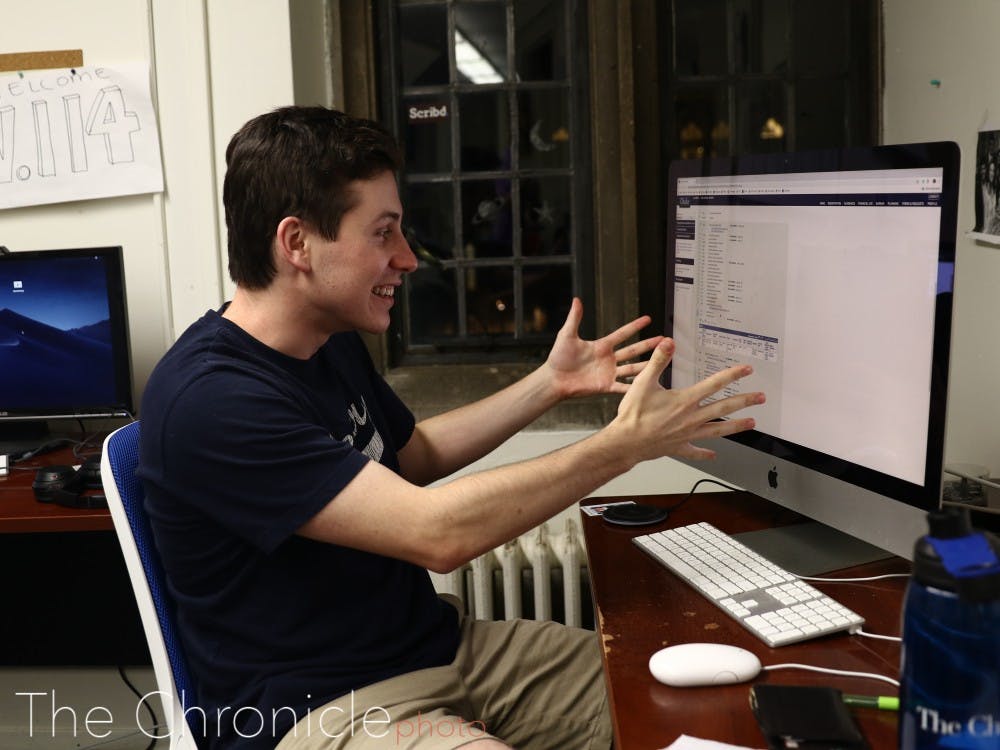Looking to add a class before drop-add ends Friday? The Chronicle is here to help.
Examining DukeHub’s course offerings for this semester, we picked out a sample of the most interesting. They vary in content, from religion and violence to Shakespeare and economics, but any of them would be a unique addition to your fall course load.
Religion 301D-001: Religion, Restrictions, and Violence
M 3:05-5:35 p.m.; cross-listed JEWISHST, POLSCI, PUBPOL, ETHICS, AMES; CCI, EI, CZ
This is taught by three professors: Abdullah Antepli, associate professor of the practice in the Sanford School of Public Policy; Ellen Davis, Amos Ragan Kearns professor of Bible and practical theology in the Divinity School; and Professor of Religious Studies Laura Suzanne Lieber. The professors’ decade-long friendship inspired the course.
In keeping with instructors’ knowledge of Islam, Christianity and Judaism, the class focuses on the continuing history of religious violence in the three religions according to the course synopsis. The curriculum examines both physical and existential violence regarding gender and contemporary identities.
“We are offering this course as a way of addressing, concretely and constructively, a fundamental question of our current moment: how do we understand violence—physical, emotional and social—done in the name of religion, particularly in a moment where talking with those with whom we disagree is ever more difficult?” Lieber wrote in an email to The Chronicle.
In May, the three professors and their four teaching assistants traveled to Israel, which has a history of religious violence between the three faiths. The trip gave the instructors “time to speak with those who are deeply involved in questions of violence and disenfranchisement in one of the most vexed places in the world, but one that is also a laboratory for responses to the challenges our course poses,” Lieber wrote.
BIO 89S-03: What Now? Discovering the Tree of Life
TuTh 1:25-2:40 p.m.; cross-listed ETHICS; NS, EI
First-years, take note of this seminar taught by Professor of Biology Cliff Cunningham. The course explores the idea of a biological “tree of life” and examines differences in DNA to study the closest relatives of a species.
The class is based on David Quammen’s book “The Tangled Tree: A Radical New History of Life.” It is part of What Now?, a group of first-year seminars that aim to help students answer important questions and live a better life.
SOCIOL 264-01: Death and Dying
TuTh 1:25-2:40 p.m.; EI, SS, service-learning course
This aptly named course examines “the biomedical, economic, social and psychological issues surrounding death and dying in the twenty-first century in America,” according to the course catalog. In doing so, it addresses religion and culture within a Judeo-Christian framework and through the lens of other religions and examines ideas from sociology and social psychology.
“I feel that it is critical for all future health care providers and other young adults need to learn about this topic so that fear doesn’t paralyze them when someone around them is dying,” wrote Deborah Gold, a research professor in the department of sociology and the course’s instructor, in an email to The Chronicle.
The course features a service-learning component, whereby students volunteer at retirement and medical sites. According to a Duke Magazine article, one student taking the course saw 11 people die while working at a medical center.
“College students live in an age-segregated society, protected from the problems that plague the world outside,” Gold told Duke’s service-learning website. “[The Death and Dying course] introduces students to the fact that death is ubiquitous and unpredictable. It also enables them to interact with much older adults or terminally ill children, people who are not part of the normative college campus.”
GSF 290S-02: #MeToo and More: Global Perspectives on 21st Century Feminist Movements
WF 1:25-2:40 p.m.; cross-listed ETHICS, PUBPOL, SOCIOL; CCI, EI, CZ, SS
#MeToo and More examines “socially constructed” ideas of justice and explores movements such as #MeToo and #Timesup, according to the course catalog. The course explores the reasons that drive women to join these movements and ways to address their root causes.
“One of the aspects of the #MeToo movement that interests me is how it resonated in a number of different cultural contexts around the globe,” wrote Juliette Duara, a senior fellow at the Kenan Institute for Ethics and the course’s instructor, in an email to The Chronicle.
She noted that “even in places like China where social critiques are generally censored, women found ways to express solidarity.”
ECON 255S-01: Shakespeare and Financial Markets
Th 4:40-7:10; cross-listed PUBPOL; CCI, SS.
What does Shakespeare have in common with the economy? Apparently, his plays “provide insight into human behavior in today’s financial markets,” according to the economics department’s website. This course looks to his writing to learn about “lessons about policy errors, cultural and political dislocation, regime changes and democratic conflicts,” along with the way bias affects decision making.
The course explores Hamlet, Julius Caesar, Twelfth Night and more. It is taught by John Forlines III, an executive in residence of economics.
Get The Chronicle straight to your inbox
Signup for our weekly newsletter. Cancel at any time.
Matthew Griffin was editor-in-chief of The Chronicle's 116th volume.

